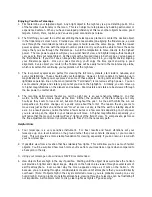
ANSWERS TO COMMONLY ASKED QUESTIONS
1. The image I see in the telescope is upside
down?
•
An upside-down image is a common
characteristic of most astronomical telescopes.
However, as described above, the ZOOM
Eyepiece will provide erect images allowing
objects that you see to be right-side-up.
2. How do I determine the power my telescope?
•
The power of your telescope can be
determined by dividing the focal length of the
objective lens by the focal length of the
eyepiece. The eyepiece focal length is the
number printed on the eyepiece. (For
example: 1000
÷
25 = 40X)
3. Where do I find the Telescope Focal Length
•
The telescope focal length is the same focal
length as the objective focal length. For this
telescope it is 750mm. Telescope focal lengths
range from 600mm to 910mm on Bushnell
telescopes.
4. What can I see with my telescope?
•
Telescopes with power ranging from 25X to
50X can be used to view Star Clusters and
Nebulae. 90X to 120X telescopes can view
galaxies. Most planets can be seen at 150X
and higher.
5. What do the numbers on the eyepiece
mean?
•
The numbers on the eyepiece represents the
“focal Length” of the eyepiece.
TROUBLESHOOTING GUIDE
If after you have set-up your new telescope you are unable to see any objects, use this Quick
Reference guide to help you to understand the cause of the problem and quickly determine a remedy
1. I’ve completed the set-up yet I cannot see
anything
•
Check to see if objective lens cover has been
removed.
•
Try to view an object that is 200 or more yards
away.
•
If there is more than one eyepiece included
with the telescope, use the lowest power
(highest number) eyepiece to begin viewing.
•
Use the
Rack & Pinion Focusing Mechanism (3)
to bring the object you are trying to view into
focus
Содержание Voyager 78-9470
Страница 1: ...470 x 60 Zoom Refractor Telescope Model 78 9470...
Страница 9: ...Intended Configuration Diagram...
















